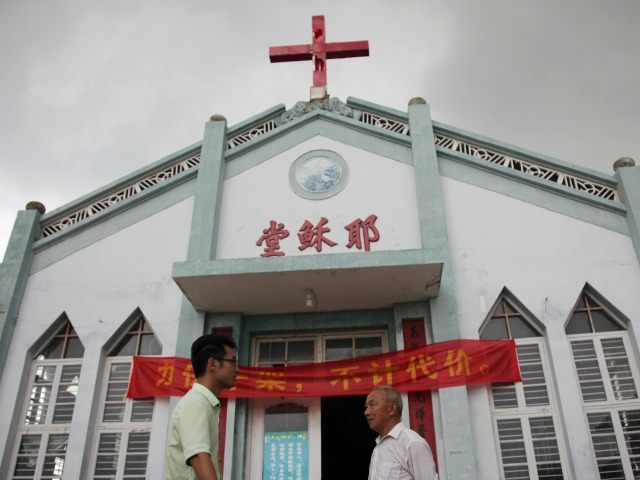The quintessential symbol of Christianity—the cross—has been outlawed on the rooftops of buildings in the Chinese province of Zhejiang, pending final approval.
Authorities have already done away with hundreds of rooftop crosses from Protestant and Catholic churches, but now they wish to implement a further injunction against any placement of the Christian symbol on top of buildings.
This week, government agencies made public a draft of regulations for religious structures, which stipulate that any crosses must be affixed to the façade of buildings rather than above the roof, and may not measure more than one-tenth of the height of the façade. Crosses also must fit in with the façade and the surroundings.
The new regulations, if approved, will give officials the legal grounds to remove all rooftop crosses.
The city of Wenzhou is known as China’s Jerusalem because it contains half of the Zhejiang province’s 4,000 churches. The city skyline used to be replete with rooftop crosses prior to a systematic crackdown in the last two years.
Since early 2014, Zhejiang officials have pulled down crosses from numerous churches, which has occasioned sometimes violent skirmishes with congregation members.
Recent reports suggest that the scale of the church demolition campaign may be much greater than previously understood. Previous estimates suggested that some 400 crosses had been forcibly removed and about 35 churches destroyed since the end of 2013.
New figures place the real number of crosses removed at 1,000, with as many as 50 churches destroyed, US-based China Aid said in its annual report for 2014.
“It appears that the scope of persecution may be wider than reported due to fear of reprisal from government authorities,” it said.
Until now, authorities have simply said that the crosses violate “building codes,” but critics have said that the growing popularity of Christianity has made the ruling Communist Party nervous.
“The authorities have attached great importance to this religious symbol,” said Zheng Leguo, a pastor from the Zhejiang province who now lives in the United States. “This means no more prominent manifestation of Christianity in the public sphere.”
Fang Shenglan, an engineer at Zhejiang Provincial Institute of Architectural Design and Research, who assisted in research for the new regulations, confirmed that rooftop crosses would no longer be allowed but declined to explain why.
“This new draft law is just another attempt by the government to legitimize its existing illegal violent campaign of destruction and removal of the cross,” said Bob Fu of China Aid.
Fu contends that the proposal reveals official concern over the spread of the Christian faith: “To continue to forcefully remove and ban the cross on the rooftop of the church buildings demonstrates the Chinese regime’s determination to contain the rapid growth of Christianity in China.”
Though the Chinese Communist Party is the largest explicitly atheist organization in the world, with 85 million official members, it is now overshadowed by an estimated 100 million Christians, which helps explain why authorities are cracking down on Christian groups.
Christianity is growing so fast in China that some predict that it will be the most Christian nation in the world in only another 15 years.
“By my calculations China is destined to become the largest Christian country in the world very soon,” said Fenggang Yang, a professor of sociology at Purdue University and author of Religion in China: Survival and Revival under Communist Rule.
In March, a Wenzhou court sentenced Chinese Christian preacher Huang Yizi to one year in prison for his public opposition to the cross demolition campaign. Supporters say the charges against him were trumped up.
According to Pastor Zheng, even though the crackdown on rooftop crosses is concentrated in one province, it wouldn’t be happening without Beijing’s approval.
Follow Thomas D. Williams on Twitter @tdwilliamsrome.

COMMENTS
Please let us know if you're having issues with commenting.